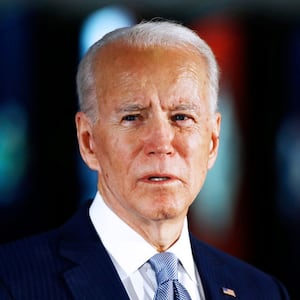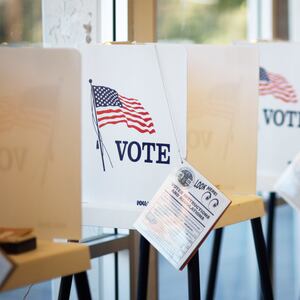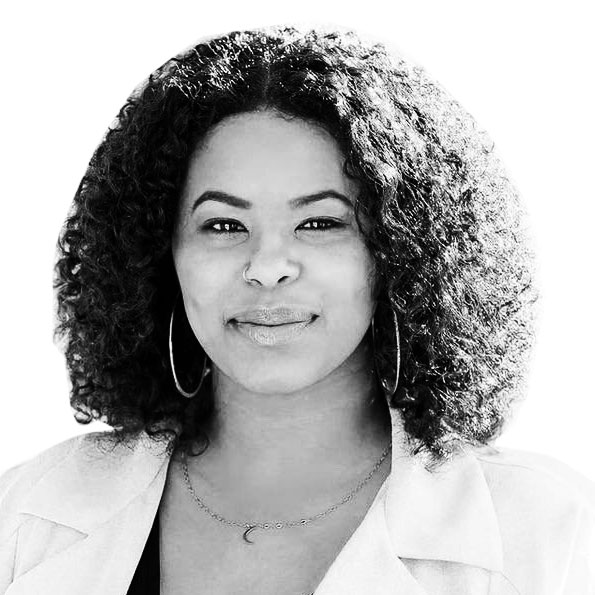MILWAUKEE — Even sitting in a car outside of a Wisconsin polling place felt like a risk to Angela Warner.
The 29-year-old wanted to wait there while her partner headed in to vote “for our family.” At eight months pregnant, Warner had already decided going inside wasn’t something she could bring herself to do.
But she wanted to do something, wanted to feel like she had tried. And the whole situation, the one facing many voters in the state torn between the urge to vote and trying to stay safe during the coronavirus pandemic, weighed deeply on the public school educator.
“This whole voting situation is fucked up,” Warner said. “I can’t believe I have to choose between voting and the safety of our child. It almost feels like choosing life or death to be honest.”
Wisconsin’s primary painfully lurched into action Tuesday, even as some Democrats in the state feared sending people to the polls could cause voters to be infected with the coronavirus, and even lead to deaths.
It went on despite a flurry of moves in the last week to postpone the primary, while both blue and red states set to hold their primaries around the same time pushed back their contests in hopes of keeping their voters safe during the pandemic.
Price County Democratic Party chairman Steve Gustafson told The Daily Beast it was “appalling” that in person voting was occurring.
"How can this not spread further? It's absurd," he said. "Obviously people are going to get sick, they're going to spread the virus and people are going to die. And that's not right."
Still, on Tuesday voters showed up, trying to be socially distant, but undoubtedly putting themselves at risk to cast their ballot. In Milwaukee, where the city’s election commission had shifted 180 voting locations to “five voting centers” because of “severe shortages in election workers,” long lines formed. The videos and photos of voters doing something so ordinary in such panicked times immediately drew expressions of shock online.
One of those voters, Ronny Hill, 65, a retired construction worker, waited over two hours to vote. Dressed in a jogging suit and wearing a medical mask, plastic gloves and a Marines baseball cap, he said his sense of duty outweighed his fear of the virus.
“Was I scared? Hell yea I’m scared!” he said.” This virus is taking out the black people in this community, but I knew what I had to do. My daddy couldn’t vote during his time, so I voted for him.”
A lengthy wait also didn’t deter Lauren Gilbert, a student support consultant and adjunct professor. The 26-year-old voted Tuesday at a polling place located in a predominantly black neighborhood and described lines that “were around the block.”
“It took me almost 2 hours to vote,” Gilbert said. “I wasn’t scared, I felt empowered. I am passionate about voting as an educator."
"I always vote, but I didn't want to be here today. I'm afraid I could get the virus and bring it home to my family, but my absentee ballot didn't arrive,” said Lilly Miller, 34, a full-time stay-at-home mom. “My husband stayed home from work with the kids so I could come vote. My husband received his ballot, so he was able to vote."
Jazemeka Fuller, 18, a senior in high school, was casting a ballot for the first time on Tuesday.
"I'm not gonna lie, I'm scared,” she said. “ When I was younger I was really excited to turn 18 and vote. My granddad used to always tell me the history of voting in this country and how Black people couldn't vote. But today, the excitement I had is gone."
In the days leading up to the contest, a chilling patchwork of stories emerged from people in Wisconsin who feared what in person voting could bring. For 23-year-old Briana Marks, it meant “extra safety precautions tomorrow, a face mask, Lysol wipes, and gloves.”
Shannon Romero, 22, a service industry worker who has been a poll worker since 2016, said the polling place consolidation was “disheartening and frustrating.”
“The polling sites are going to see thousands of voters for those who didn’t have the ability to vote absentee, and yet that level of congestion jeopardizes the health of workers and other voters,” Romero said. “It steals the right of the elderly and those with compromised immune systems, and it discourages those without access to childcare or cars or time between work.”
The tense situation awaiting voters, who were forced to weigh whether it was worthwhile to risk one's health to cast an in person vote Tuesday, could be seen coming for weeks. Four states were scheduled to hold primaries on March 17 despite the coronavirus pandemic playing out in their states. While Arizona, Florida, and Illinois still held their primaries, unprecedented moves by the Republican governor of Ohio led to the state pushing back its plans to vote in person that same day.
And even though a portrait of confusion emerged from the states that went ahead with their contests as planned, Wisconsin’s Democratic Governor Tony Evers only moved in recent days to try and unsuccessfully push back his state’s primary.
His eleventh hour attempt to delay the contest was blocked first by the state’s Republican legislature and then by the state’s supreme court Monday.
In a statement following the state supreme court’s decision, Wisconsin House Speaker Robin Vos and Senate Majority Leader Scott Fitzgerald maintained that “we advocated for everyone to vote absentee.”
“We continue to believe that citizens should be able to exercise their right to vote at the polls on Election Day, should they choose to do so,” the state GOP leaders said in the joint statement.
In a ruling late Monday, the U.S. Supreme Court said that absentee ballots must be “postmarked by election day,” undoing a lower court’s decision that ballots postmarked after Tuesday’s election would “still be counted so long as they are received by April 13.”
“If you think that this is what should be happening today, you’re either uninformed about coronavirus, a nihilistic partisan, or a Republican-appointed Justice of the Supreme Court of the United States,” Wisconsin Democratic Party Chairman Ben Wikler tweeted Tuesday morning about a video of Waukesha voters standing in line.
Over 1.2 million absentee ballots had been requested in Wisconsin, according to the state’s elections commission. It reported Tuesday that close to 865,000 had been returned.
On a call with reporters Tuesday afternoon, Kristen Clarke, the president and executive director of the Lawyers’ Committee for Civil Rights Under Law, said a top concern coming out of Wisconsin were people who requested, but did not receive, an absentee ballot.
"And many of those individuals are not in a position to go to one of the few polling sites that are open across the state today, and are now in the dark about what they can do to ensure that their voice is heard this election season," Clarke said.
But a severe shortage of poll workers that became clear to officials last week meant that the prospect of voting in person could be a perilous choice in a state where Gov. Evers had already issued a stay at home order to help fight the spread of COVID-19.
As of Monday, the state’s health department listed 2,440 COVID-19 cases in Wisconsin.
“Although I remain deeply concerned about the public health implications of voting in-person today, I am overwhelmed by the bravery, resilience, and heroism of those who are defending our democracy by showing up to vote, working the polls, and reporting on this election,” Evers tweeted Tuesday.
Last week, both Sen. Bernie Sanders (I-VT) and the state Democratic party called for the election to be postponed. Former Vice President Joe Biden did not join that call. The presumptive nominee still has a ways to go before reaching the delegate threshold he needs to officially become the Democrats' nominee for president.
President Donald Trump has also weighed in on the state’s supreme court contest, with little concern for the optics of encouraging in person voting during a public health crisis. Just days before, Trump had told the country “this is going to be a very painful, very, very painful two weeks,” when it came to the coronavirus pandemic.
Tuesday morning, the president tweeted, “Wisconsin, get out and vote NOW for Justice Daniel Kelly. Protect your 2nd Amendment!”
The election also meant some voters had to make the kind of hard decisions about their health and well being that would have been unnecessary during any normal time.
John Kenney, an electrician, waited two hours in drive-thru voting on Sunday in order to early vote. His wife has a pre-existing condition, and he did not feel comfortable voting on Tuesday.
“Thank God I have a car and I had the time to do that, but for the people that can’t, this paints a bigger picture of the state of our politics,” Kenney said.
The 43-year-old worried that voting in person could mean being exposed to the virus.
“I’m angry [about voting], but I’m glad I voted,” he said.









